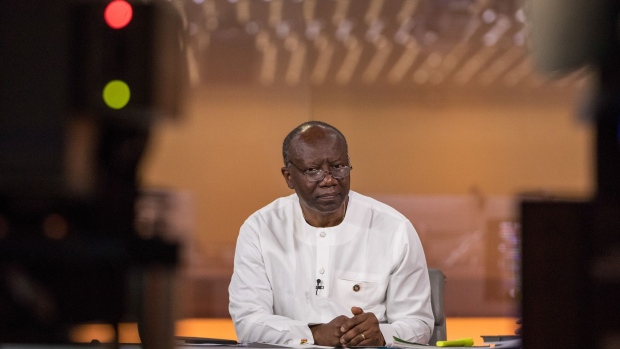Mar 3, 2023
Ghana Missed Interest Payment Sparks Default Coverage Payout
, Bloomberg News

(Bloomberg) -- A panel of investors and banks has ruled Ghana’s missed coupon payments on its foreign denominated bonds counts as a failure-to-pay event, paving the way for a payout of the default-insurance contracts tied to the country’s debt.
The Credit Derivatives Determinations Committee (CDDC) made the decision at a meeting held on Monday, according to a notice on the panel’s website on Friday. Ghana skipped payment of interests on Jan. 18 of a $1 billion eurobond maturing in 2026. The missed payment triggered a 30-day grace period, which eventually expired at the end of the day on Feb. 17.
The ruling triggers the payout of the insurance protection on Ghana’s sovereign debt. Credit-default swaps covered a gross $66.4 million and net $34.4 million of Ghana’s debt as of Feb. 10, according to data from the Depository Trust & Clearing Corp.
The nation’s eurobonds were unchanged following the decision, with the majority of the notes trading at a discount of 60-65% versus their face value, according to CBBT pricing compiled by Bloomberg.
The swaps panel had already ruled in January that Ghana’s decision to suspend debt servicing on its eurobonds, commercial term loans and most of its bilateral debt met the definition of a “potential repudation/moratorium.” This happened before the grace period on the first missed payment had expired.
Ghana has been engaging investors since November to restructure about $30 billion of its $46 billion in local and international debt. It recently completed the first part of a domestic restructuring, with investors exchanging 83 billion cedis ($6.5 billion), or 64% of holdings, for new securities, against an overall target of 80%. It aims to start “substantive” discussions with international bondholders and their advisers in coming weeks, Minister of Finance Ken Ofori-Atta said Feb. 16.
Meanwhile, the African nation has also kicked off talks with China to restructure bilateral loans, as reported by Bloomberg News earlier this week.
(Adds bond pricing in fourth graph, background in fifth and seventh graphs.)
©2023 Bloomberg L.P.






